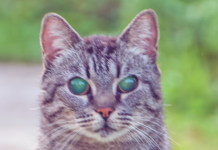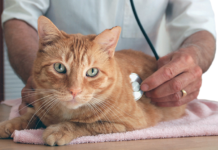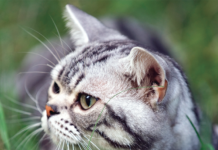FIV Unlikely to Cause Blindness
Sebastian, a big orange longhair, was adopted in 2009. He tested positive for feline immunodeficiency virus (FIV), but had no symptoms. In 2017, he started to have eye symptoms and eventually appeared to be blind. He was eating, drinking, socializing, and had regular urination and defecation. Three months ago, he began bleeding from his nose and eventually from his eye and crusting.
IBD Is Chronic GI
Its a common misconception that vomiting is normal in cats. Cats should not routinely vomit more than once per week. The possible causes include everything from gastrointestinal (GI) parasites to dietary indiscretion to foreign bodies. In middle-aged to older cats, inflammatory bowel disease (IBD) is a frequent culprit.
Congestive Heart Failure
Congestive heart failure (CHF) is often the stage of disease at which a cardiac problem is first diagnosed. When a cat has CHF, the heart no longer functions as an efficient pump, unable to bring enough oxygen and nutrients to the body cells and move waste products such as carbon dioxide out. Fluid buildup can occur, usually in the lungs (pulmonary edema) and in the chest cavity around the lungs (pleural effusion). …
Cats Are Resistant to Lyme Disease
Recently, my dog was diagnosed with Lyme disease. When I asked my vet about checking my cats, he said that cats did not get Lyme because of how they groom themselves. I have read several accounts of pet parents looking for help because their cat contracted Lyme. Can you please clear up this quandary and list symptoms?
Can Heart Disease Reverse Itself?
Our cat was diagnosed with hypertrophic cardiomyopathy at 2 years of age, which was a shock to us, given the fact that he seems perfectly healthy. Our veterinarian did not prescribe medication and told us to monitor him closely.
Bloodwork for Kidney Disease
Kidney disease can be a serious problem, especially older cats, but it can be difficult to catch. Your cat must lose up to 75 percent of her kidney function before changes become evident on standard screening bloodwork. A routine urinalysis, however, may give your veterinarian a heads up that a blood renal panel should be run to specifically evaluate kidney function
Mirtazapine for Liver Disease
Mirtazapine, a tricyclic depressant for humans, has been shown to have appetite stimulant benefits for cats. Since cats who have a decreased appetite can develop life-threatening conditions such as hepatic lipidosis, this medication can have important uses in cats.
Mammary Cancer Often Spreads
A mammary tumor, aka breast cancer, is the third most common type of cancer in cats. Generally, mammary cancer is found in cats 10 years of age and over and usually in females. However, Siamese and Persian cats have a higher risk compared to other breeds and may develop tumors at an earlier age.
On the Alert for Liver Problems
The liver is one of the busiest organs in your cats body and is a real multitasker. While it does have amazing regenerative powers, once 75 percent of the healthy tissue is gone, clinical signs of illness usually will start to appear. By then it can be too late for treatment to help beyond palliative measures, so be alert for early signs.
Feline Parasite May Jump-Start New Businesses
Medical News Today reported that a new study found that an infection with the cat-borne parasite Toxoplasma gondii makes people more risk-prone and likely to start a business. T. gondii, a protozoan parasite that infects 2 billion people a year, is found in domestic and wild cats. The Centers for Disease Control and Prevention say 11 percent of the U.S. population over the age of 6 may be infected.
Feline Lymphoma
Lymphoma is the most common feline cancer. Over the years, however, with increased testing and vaccination for retroviruses like feline leukemia virus (FeLV) and feline immunodeficiency virus (FIV), the exact type of lymphoma seen in cats has changed.
Tilting Heads and Drunken Walks
Normally your cat is an amazing athlete. She can do flips and land right side up, even after a tumble from a tree or window, and can leap from floor to countertop in just one bound. But when vestibular problems strike, that same cat walks like the proverbial drunken sailor.
















